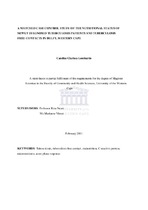| dc.description.abstract | Background: Malnutrition is a risk factor for the development of pulmonary tuberculosis (TB) and may be responsible for the premature deaths of patients with active disease. An adequate nutritional status may therefore be protective in delaying the onset from latent infection to active disease. In South Africa, very little data is available on the nutritional status of adults who present with tuberculosis. This study therefore aims to compare the nutritional status of newly
diagnosed pulmonary tuberculosis patients with TB-free controls.Study population & Design: This is a community based case-control study. Forty-three newly diagnosed pulmonary tuberculosis patients were recruited as cases and matched according to age,gender and race to 43 TB-free close contacts. HIV positive subjects were excluded from the study.Methods: Each participant was interviewed and completed a structured questionnaire to obtain demographic information. Weight was measured to the nearest 0.1kg and height to the nearest 1mm. A 24-hr dietary recall method was used to obtain dietary information. Biochemical analysis was carried out to measure concentrations of transferrin, albumin, CRP, ferritin, zinc,copper, vitamin A and E.Results: The median Body Mass Index (BMI) for cases was 18.80kg/m² (IQR 14.35, 32.11) and TB-free contacts 21.17 kg/m² (IQR 16.75, 34.98) with a significant difference between the groups of p=0.001. There was significant difference in weight (p=0.002) and MUAC (p=0.000)between groups. No significant difference in dietary intake of energy (KJ) (p=0.695), protein(p=0.804), CHO (p=0.801) and fat ( p=0.796) was found between groups. There was a
statistically significant increase in ferritin (p=0.000) and C-reactive protein (CRP) (p=0.000) in TB patients, while albumin (p=0.000), serum zinc (p=0.000) and serum vitamin A (p=0.000) were statistically significantly lower among cases.
Conclusion: There was no significant difference in the macronutrient intake of TB cases and TB-free contacts, although a significant difference was seen in BMI, MUAC and weight between groups, with all these parameters being lower in TB patients. Ferritin and CRP levels were markedly increased in TB cases while serum zinc, vitamin A and albumin are all significantly lower in TB patients than TB free contacts. | en_US |

